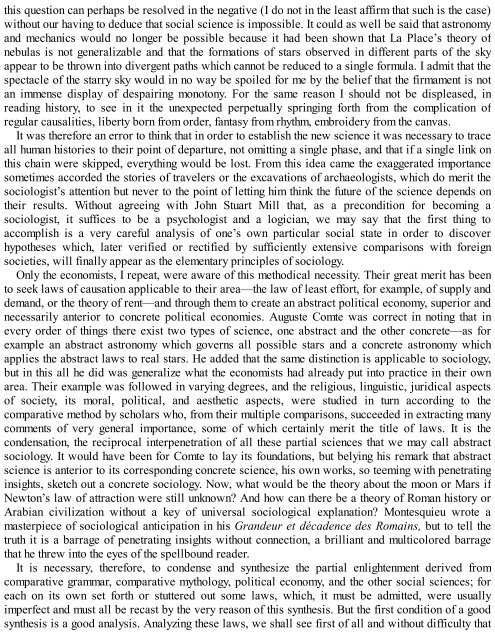3658925934
Create successful ePaper yourself
Turn your PDF publications into a flip-book with our unique Google optimized e-Paper software.
this question can perhaps be resolved in the negative (I do not in the least affirm that such is the case)<br />
without our having to deduce that social science is impossible. It could as well be said that astronomy<br />
and mechanics would no longer be possible because it had been shown that La Place’s theory of<br />
nebulas is not generalizable and that the formations of stars observed in different parts of the sky<br />
appear to be thrown into divergent paths which cannot be reduced to a single formula. I admit that the<br />
spectacle of the starry sky would in no way be spoiled for me by the belief that the firmament is not<br />
an immense display of despairing monotony. For the same reason I should not be displeased, in<br />
reading history, to see in it the unexpected perpetually springing forth from the complication of<br />
regular causalities, liberty born from order, fantasy from rhythm, embroidery from the canvas.<br />
It was therefore an error to think that in order to establish the new science it was necessary to trace<br />
all human histories to their point of departure, not omitting a single phase, and that if a single link on<br />
this chain were skipped, everything would be lost. From this idea came the exaggerated importance<br />
sometimes accorded the stories of travelers or the excavations of archaeologists, which do merit the<br />
sociologist’s attention but never to the point of letting him think the future of the science depends on<br />
their results. Without agreeing with John Stuart Mill that, as a precondition for becoming a<br />
sociologist, it suffices to be a psychologist and a logician, we may say that the first thing to<br />
accomplish is a very careful analysis of one’s own particular social state in order to discover<br />
hypotheses which, later verified or rectified by sufficiently extensive comparisons with foreign<br />
societies, will finally appear as the elementary principles of sociology.<br />
Only the economists, I repeat, were aware of this methodical necessity. Their great merit has been<br />
to seek laws of causation applicable to their area—the law of least effort, for example, of supply and<br />
demand, or the theory of rent—and through them to create an abstract political economy, superior and<br />
necessarily anterior to concrete political economies. Auguste Comte was correct in noting that in<br />
every order of things there exist two types of science, one abstract and the other concrete—as for<br />
example an abstract astronomy which governs all possible stars and a concrete astronomy which<br />
applies the abstract laws to real stars. He added that the same distinction is applicable to sociology,<br />
but in this all he did was generalize what the economists had already put into practice in their own<br />
area. Their example was followed in varying degrees, and the religious, linguistic, juridical aspects<br />
of society, its moral, political, and aesthetic aspects, were studied in turn according to the<br />
comparative method by scholars who, from their multiple comparisons, succeeded in extracting many<br />
comments of very general importance, some of which certainly merit the title of laws. It is the<br />
condensation, the reciprocal interpenetration of all these partial sciences that we may call abstract<br />
sociology. It would have been for Comte to lay its foundations, but belying his remark that abstract<br />
science is anterior to its corresponding concrete science, his own works, so teeming with penetrating<br />
insights, sketch out a concrete sociology. Now, what would be the theory about the moon or Mars if<br />
Newton’s law of attraction were still unknown? And how can there be a theory of Roman history or<br />
Arabian civilization without a key of universal sociological explanation? Montesquieu wrote a<br />
masterpiece of sociological anticipation in his Grandeur et décadence des Romains, but to tell the<br />
truth it is a barrage of penetrating insights without connection, a brilliant and multicolored barrage<br />
that he threw into the eyes of the spellbound reader.<br />
It is necessary, therefore, to condense and synthesize the partial enlightenment derived from<br />
comparative grammar, comparative mythology, political economy, and the other social sciences; for<br />
each on its own set forth or stuttered out some laws, which, it must be admitted, were usually<br />
imperfect and must all be recast by the very reason of this synthesis. But the first condition of a good<br />
synthesis is a good analysis. Analyzing these laws, we shall see first of all and without difficulty that









![Genki - An Integrated Course in Elementary Japanese II [Second Edition] (2011), WITH PDF BOOKMARKS!](https://img.yumpu.com/58322134/1/180x260/genki-an-integrated-course-in-elementary-japanese-ii-second-edition-2011-with-pdf-bookmarks.jpg?quality=85)
![Genki - An Integrated Course in Elementary Japanese I [Second Edition] (2011), WITH PDF BOOKMARKS!](https://img.yumpu.com/58322120/1/182x260/genki-an-integrated-course-in-elementary-japanese-i-second-edition-2011-with-pdf-bookmarks.jpg?quality=85)





